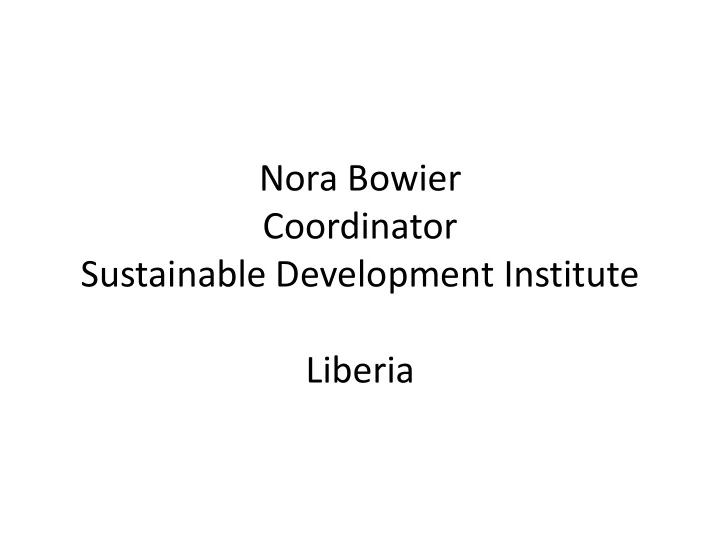

Nora Bowier Coordinator Sustainable Development Institute Liberia
SDI • A rights base NGO (social justice and equality, environmental sustainability, governance) • Working across natural resource sector (mining, logging, land and agriculture) • 3 Core programs including Forest Governance, Community Land Protection and Community Rights and Cooperate Governance • www.sdiliberia.org
Core area of expertise • Research, monitoring and reporting how government and companies conduct their actions and expose the bad practices and gaps • Advocacy and campaign : for reform at policy level (participation, equal benefits, recognition of rights to resources, accountability, transparency) • Empowering grass roots communities (training, organizing, mobilizing and support their actions in pushing for their rights)
About the projects • Title: Early Warning System and Valuation and TIMBY • Located across the country including Rivercess, Sinoe, Gbarpolu, • most of the communities are poor, agrarian, natural resources dependent, hunting, farming, fishing, artisanal mining, NTFP trade. • Are built into our various programs on land, forest and mining
Liberia context • In an effort to stimulate economic growth, increase agricultural exports, and create employment, series of “concession agreements” with multinational oil palm producers • Oil palm plantation expansion is now a major threat to forests, customary land rights and communities livelihoods • Sime Darby has a concession of 311, 187 ha, Indonesian Golden Veroleum 350,000 ha, and UK based Equatorial Palm Oil 34,500 ha
Liberia Context • no formal attempt to solicit the input, consent, or perspective on the proposed plantation development prior to the contracts being signed. • in the event of approaching rural communities seeking land for logging, mining, and agribusiness ventures “consultation” are generally conducted in a context of significant power and information asymmetries. • Part of the power imbalance comes from communities’ lack of information about the value of community lands and natural resources.
What is the result? • Extreme loss of livelihoods and seriously compromised by forest clearing • Widespread environmental damage and devastation of forest • Communities lose access to farmland, Non-Timber Forest Products, sacred sites, and protein from hunting • Communities are not compensated well for their losses There were extremely low rates of compensation for crop destruction • Inherent inappropriateness of removing all bargaining power from rural constituencies that will suffer the brunt of the projects’ social impact
What is the result • Communities ’ resistance is reacted to by harsh, brutal and violent responses by concessionaire and government and their concerns to protect their land or receive fair benefit in the process are not addressed. • Removing vast tracts of food-producing land from an already food-insecure country like Liberia – which currently imports more than 50%
Project Early warning • A system intended to provide communities approached by an investor with real time information • Direct intervention in community investor engagements (e.g. mining, logging, and plantation), • Support (organizing, training on FPIC principles, provide documents and analysis) to enhance community capacity to negotiate investors -Help communities to reflect on the pros and cons of their decision.
Project Early Warning • goals are to help level information asymmetries, support communities to thoughtfully accept or reject investors’ proposals, • ensure communities’ fully informed consent to investment deals, • support the negotiation of fair contracts that will lead to authentic community prosperity and development.
Project Land Valuation Exercise, • conducted focus group, interactive discussion with diverse members of a community • E.g. special attention paid to sector and gender specific groups, like women (i.e. mothers, fishers), youth (i.e. palm cutters), elders (i.e. traditional healers), men (i.e. hunters, fishers, farmers), with the different groups discussing the value each set of actor gets from the Land.
Project Timby • Consist a suite of interconnected digital tools, which uses to address a range of governance challenges in Liberia’s natural resource and health sectors. • It has three components: mobile app, moderator dash board, story telling
Bigger picture • Drivers of expansion of the oil palm sector to produce crude palm oil mainly for markets in Europe, the US and Asia (for consumer products and for bio fuel production) need to be addressed.
Bigger picture • Introduce tougher regulations on imports of agriculture commodities to Europe, as it is now the case with timber, and support to African countries - for example Liberia - to strengthen governance and improve the land tenure security of communities. • Build on existing initiatives for e.g. in Liberia the VPA between Liberia and the EU on the agriculture sector;
Recommend
More recommend